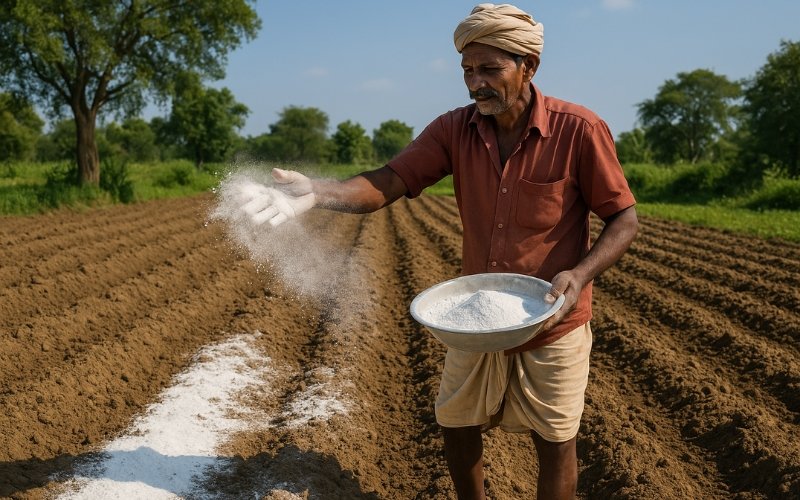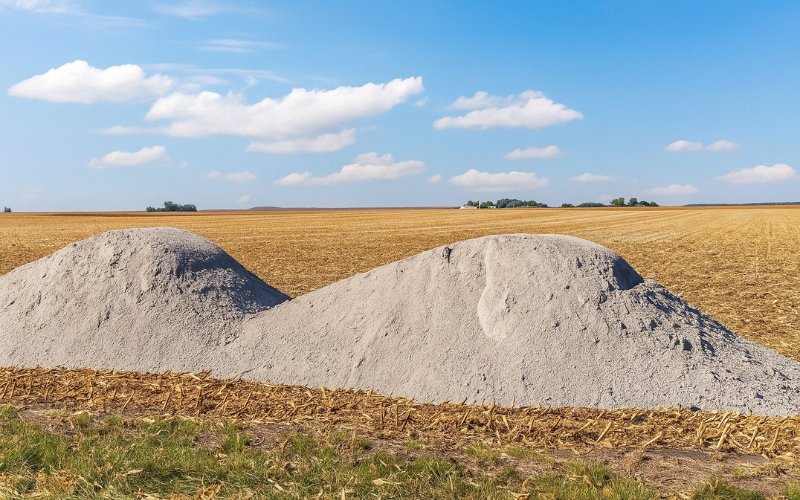Table of Content
- Introduction: Why Soil pH and Crop Yield Matter in Farming
- What Is Agricultural Limestone?
- Role of Limestone in Soil Fertility
- How Limestone Improves Soil pH
- Benefits of Limestone in Soil and Crop Production
- How to Apply Limestone in Farming (Dosage and Methods)
- Choosing the Right Lime: Calcitic vs Dolomitic (Comparison Table)
- How to Identify If Your Soil Needs Lime
- Limestone Use in Indian Agriculture: Region-Wise Application Guide
- Why Choose Synergy Chemical Industries for Agricultural Lime
- FAQs
- Ready to Rebalance Your Soil and Boost Yields Naturally?
Introduction: Why Soil pH and Crop Yield Matter in Farming
Soil is more than just a growing medium it’s a living system that supports plant health. One of the most overlooked factors in successful farming is soil pH. When the pH is off especially too acidic plants struggle to absorb essential nutrients like nitrogen, phosphorus, and potassium, even if those nutrients are present.
This is where limestone becomes an essential tool. Used as a soil conditioner, it helps balance soil pH, improves nutrient availability, and ultimately boosts crop yield. For farmers across India, especially in regions with acidic soils, understanding how to use limestone effectively can transform agricultural outcomes.
What Is Agricultural Limestone?

Agricultural limestone, often called aglime, is a crushed or powdered form of natural limestone. It’s rich in calcium carbonate (CaCO₃), and when applied to soil, it neutralises excess acidity.
At Synergy Chemical Industries, we provide finely ground limestone powder for farming, designed specifically to correct soil imbalances without harming soil biology. It’s a natural, cost-effective method for improving long-term soil health.
Types of Limestone: Calcitic vs Dolomitic Lime
There are two primary forms of agricultural lime:
- Calcitic Lime – High in calcium carbonate, ideal for soils that need calcium replenishment.
- Dolomitic Lime – Contains both calcium and magnesium carbonates, suited for soils low in magnesium.
Choosing the right type depends on your soil’s specific nutrient profile, which we’ll explore further below.
Role of Limestone in Soil Fertility
Limestone plays a vital role in promoting soil fertility by:
- Reducing Soil Acidity: Lime neutralises hydrogen ions in the soil, raising the pH toward neutral.
- Improving Nutrient Uptake: At optimal pH, plants can access and absorb nutrients more effectively.
- Enhancing Microbial Activity: Soil microorganisms involved in decomposition and nitrogen fixation function best at pH 6.5 to 7.0.
- Supporting Root Development: Calcium strengthens cell walls and supports robust root systems.
In essence, limestone for agriculture acts as a soil stabiliser, ensuring a fertile and productive growing environment.
How Limestone Improves Soil pH
Acidic Soils and Their Impact on Crops

Acidic soils are common in high rainfall regions like Assam, Kerala, Odisha, and parts of Maharashtra. Symptoms of acidic soil include:
- Yellowing of leaves
- Poor root growth
- Stunted plants
- Reduced flowering or fruiting
These issues aren’t always due to nutrient deficiency but often result from pH imbalance.
Correcting Soil pH with Lime Powder
When you apply agricultural lime, the calcium carbonate reacts with acidic components in the soil, neutralising them. This chemical process raises the pH and improves conditions for nutrient uptake.
It’s a natural solution with long-term benefits that are both sustainable and cost-effective for Indian farmers.
Benefits of Limestone in Soil and Crop Production

Using agricultural lime for crop yield improvement offers several advantages:
- Enhanced nutrient efficiency (especially nitrogen and phosphorus)
- Better root penetration and water absorption
- Increased microbial activity and nitrogen fixation
- Improved soil structure and tilth
- Reduction in heavy metal toxicity in acidic soils
When applied correctly, limestone can lead to a 10%–25% increase in crop yields, especially in acidic and marginal soils.
How to Apply Limestone in Farming (Dosage and Methods)
Application depends on your soil test results, but here’s a general guide:
Recommended Dosage:
- Lightly acidic soils (pH 5.5–6.0): 500–1000 kg per hectare
- Strongly acidic soils (pH < 5.0): 1500–2000 kg per hectare
Application Methods:
- Manual Broadcasting – Suitable for small farms
- Mechanical Spreaders – Ideal for large-scale operations
- Incorporation into Soil – Plough or till after application for best results
Apply during dry periods or just before sowing for optimal effect.
Choosing the Right Lime: Calcitic vs Dolomitic
| Feature | Calcitic Lime | Dolomitic Lime |
| Primary Component | Calcium Carbonate | Calcium + Magnesium Carbonates |
| Suitable for Soils | Low in Calcium | Low in Magnesium |
| Reaction Speed | Faster | Slower |
| Soil Type Preference | Light to medium soils | Heavy or clayey soils |
| Availability | Moderate in India | Widely available in India |
Choose based on soil test recommendations. Synergy Chemical Industries supplies both variants.
How to Identify If Your Soil Needs Lime
You don’t need to guess there are clear signs and tools:
- Visual Indicators: Yellow leaves, low yields, poor plant vigor
- DIY pH Kits: Inexpensive and fairly accurate for field testing
- Lab Testing: Recommended for precision farming and large plots
- Crop-Specific Response: Some crops like wheat, groundnut, and pulses are highly sensitive to soil acidity
Knowing your soil condition is the first step toward better productivity.
Limestone Use in Indian Agriculture: Region-Wise Application Guide
| Region | Soil Type | Typical pH Range | Recommended Lime |
| North East India | Red Lateritic | 4.5 – 5.5 | Dolomitic Lime |
| Eastern States | Alluvial & Clayey | 5.0 – 6.0 | Calcitic Lime |
| South India | Sandy & Coastal | 5.5 – 6.5 | Either Type |
| Central India | Black Cotton Soil | 6.0 – 6.8 | Minimal Need |
Lime application should be tailored to local soil types and crop rotation.
Why Choose Synergy Chemical Industries for Agricultural Lime
At Synergy Chemical Industries, we specialise in high-quality limestone powder for farming that meets agricultural standards and delivers consistent results.
Why farmers prefer our products:
- Purity Above 90% calcium carbonate
- Fine Particle Size for better reactivity
- Region-Wise Availability across India
- Reliable Logistics and bulk supply options
- Expert Guidance on application and dosage
We are among the leading limestone manufacturers in India, trusted by farmers, agri-companies, and co-operative societies.
FAQs
Q1. What is the best type of lime to use for Indian farms?
Answer: It depends on your soil. Calcitic lime is ideal for calcium-deficient soils, while dolomitic lime works well in magnesium-deficient, acidic soils.
Q2. How long does it take for lime to improve soil pH?
Answer: Effects begin within 2–4 weeks but full pH adjustment may take up to 3 months depending on soil type and application method.
Q3. Can limestone be used in organic farming?
Answer: Yes, natural agricultural limestone is permitted in organic farming as a soil conditioner.
Q4. Is dolomitic lime better for acidic soils?
\Answer: It’s effective in acidic soils low in magnesium. For soils lacking only calcium, calcitic lime is more suitable.
Q5. How much lime powder should I apply per acre?
Answer: Typical dosage ranges from 500 kg to 2000 kg per hectare based on soil pH. Always test your soil first.
Q6. Where can I buy quality agricultural lime in India?
Answer: You can source premium-grade lime from Synergy Chemical Industries, one of the leading lime manufacturers in India.
Q7. Can I apply lime during the monsoon season?
Answer: It’s better to apply lime before the rains begin to avoid leaching and ensure better soil incorporation.
Ready to Rebalance Your Soil and Boost Yields Naturally?
Limestone isn’t just a remedy it’s a long-term strategy for healthier soil and higher productivity. Whether you’re facing acidic soils, declining yields, or struggling nutrient availability, the right lime can restore balance and unlock better crop performance.
At Synergy Chemical Industries, we’re committed to helping Indian farmers make informed, confident decisions with agricultural-grade limestone products that are consistent, reliable, and tailored for regional soils.
Don’t let acidic soil hold your crops back. Explore our agricultural lime solutions and take the first step toward building fertile, productive farmland naturally.


